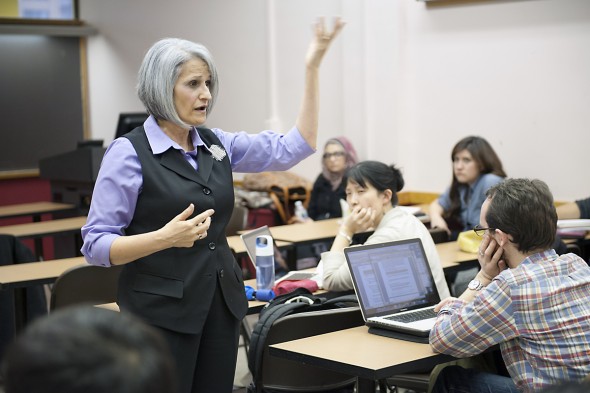Recruiting teachers to high-need areas

“It’s really about getting a feeling for who learners are as individuals,” says Carole Mitchener. Photo: Roberta Dupuis-Devlin
The Award for Excellence in Teaching, a $5,000 salary increase, is UIC’s only peer-selected teaching award. Winners are chosen by those who received the award in past years.
“When I walk into a school, I think, ‘This is why I do this,'” says Carole Mitchener.
Mitchener, associate professor of curriculum and instruction in the College of Education, heads Secondary Science, a master’s degree program that recruits science teachers for middle and high schools in high-need areas of Chicago.
Secondary Science began as a three-year pilot program in 2009, supported by two National Science Foundation grants. By May, it will have graduated 60 teachers of biology, physics, environmental science and earth and space science.
Some students are career-changers with strong backgrounds in STEM fields. Others were science undergraduates.
Ninety-five percent of the program’s graduates are teaching science, most in high-need Chicago schools.
Mitchener has spent a lot of time in Chicago public schools over the last 10 years, “learning from urban youth about their ways of making sense of science,” she says.
She also spent six years teaching middle and high school in different states.
She found that some teachers of science are not certified as science teachers, have too little knowledge of the content and are prone to high turnover, leading to “concentrated inequities” that she emphasizes to teachers in training.
“It’s really about getting a feeling for who learners are as individuals and as members of a learning community, their cohort; and then not only helping them progress in their journeys, but also relate those journeys to the larger picture of social inequality, and challenging those inequities,” she says.
“We do that by teaching our students to connect theory and practice constantly in ways that serve the students in the schools.”
Since she was named associate dean for programs and evaluations last year, Mitchener is teaching less and seeking a full-time coordinator for the Secondary Science Program. But she feels no less committed to it.
“I’m so passionate about what we’re doing, working so closely with Chicago Public Schools, and particularly schools that are in great need of good science teaching,” she says.
“Many teachers in these schools are doing wonderful things, so we’re not going in to save them, but working with them to keep making it better.”
Other Award for Excellence in Teaching winners
Promoting social justice, human rights: Mark Mattaini
A hands-on approach to learning: Michael J. Scott, engineering
Raising the bar for ‘dream’ students: Luigi Salerni
